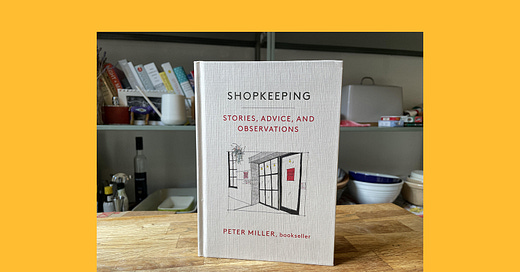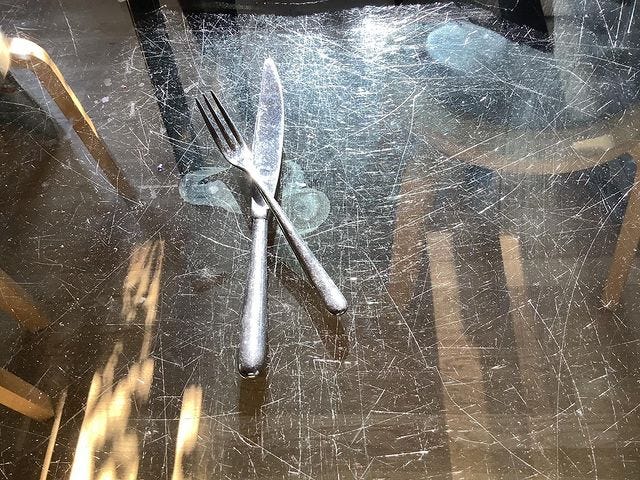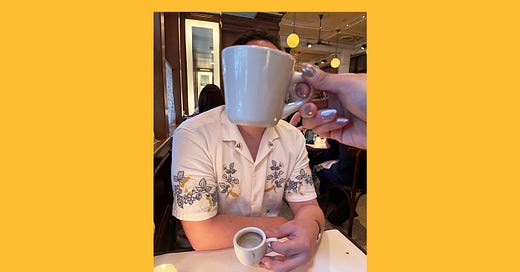

Discover more from One Thing
Kyle Chayka: Peter Miller might be the cultural embodiment of if you know, you know, and I have to admit, I did not know. He is the owner of Peter Miller Books, an architectural bookstore and purveyor of quality objects in Seattle that has survived for more than 40 years. I’ve never been there, but I feel like I have, because I read Miller’s new slim volume Shopkeeping: Stories, Advice, and Observations, which is a manual slash memoir that contains his philosophy of retail. You know I love a slim volume, and this is a beautiful one. Bound in thick, gray linen paper, with a sketch of the storefront on the cover, the book is an objet in itself. Over its scant 136 pages, in airy, straightforward paragraphs, Miller makes the case that shopkeeping is a kind of meditative art form, a holistic practice that requires not just enlightened taste but intense discipline, thinking about everything all the time.
Who does not dream of opening their own perfect little boutique? A shoppy shop of niche ingredients or a curated fashion retailer stocked with just the right brands and sizes. We’d stand behind the counter and welcome one customer at a time, who would doubtless make enough pricey purchases that we could pay our exorbitant rent in some desirable urban neighborhood. The reality is much less glamorous: staffing the store every hour it’s open, sweeping the floor, storing boxes of products, checking your Google reviews. Maybe the reason that Miller succeeds is that he considers the banalities as core to the art of shopkeeping. Chores aren’t a distraction; they are the act itself. Here’s what he writes under the heading of “Passing Time”:
You never want to wait. As a shopkeeper, you never want the position where you can only wait. You want the job to be like any job, with things to do, a day full of things to do. You have invented the job, you have invented the culture, and part of your task is to fill that day, to make the job a part of the parade of a day.
You may have too much to do. Too many boxes have arrived, too many things need to be inventoried and arranged and entered. But, as a shopkeeper, you quietly have a further task — you must sell something.
“You have invented the culture” — so lovely! The shopkeeper is the one who animates the space, who keeps the shop alive. One scene from the book that sticks in my mind is Miller taking advantage of a slow day to rearrange the displays in his store. The refreshed displays bring some ineffable new vibe to the environment, which then attracts shoppers once more. In another moment, he narrates how he adapted the store into its new location by slowly shifting the location of the check-out counter. Only after many tries did he finally get it right and the composition of the shop was complete. To settle in to a static answer, to stop trying to seek a slightly better solution, would be to fail.
To Miller, shopping is spiritual, an act of seeking. The store is a utopian space, akin to a church or a public art gallery but not so demanding of its visitors:
You do not need to order something, nor even to explain why you have come in. You do not need a reservation. You do not even need a purpose. You come to a shop because it has something you need, or simply to see what it has.
A shop must be inspirational for its customers, leading them to a place or a mental state they had not considered. Like a bustling restaurant, it should tempt you:
Walk into an Imperfetta wine shop and all you can think of is wine. Walk into a good bike shop and you want to ride. Walk into a fine food shop and you want to cook. Walk into Flora and Henri and you want to dress up. Walk into Edit., and you can only think of linen.
How nice is that paragraph!! To that I might add, read Shopkeeping and you want to build that dream boutique, put on an apron, and flip a sign in the window that says Open. For me, Shopkeeping is an instant classic, the kind of gently incisive interrogation of aesthetics that I will hold on to forever, much like Tanizaki’s 1933 essay In Praise of Shadows, which one of the illustrations in Miller’s book depicts. I don’t say this lightly, but if you enjoy this newsletter, you should get this book. I think the One Thing audience could blow it up. Then we can all plan our shops together.
PS: Miller sees the unchecked internet as somewhat oppositional to good shopkeeping, but his Instagram is phenomenal, with a blend of food, art, fashion, nature, and the plain stuff of life that makes me recall Insta’s early-2010s glory days.
Further One Thing reading:
Is boutique a bad word? A debate on the preciousness of retail and why we’ve taken to describing everything as “curated” and “boutique.”
















quite happy to see that use of the french word ‘objet’ 🫶 instant add to the reading list as well, thank you.